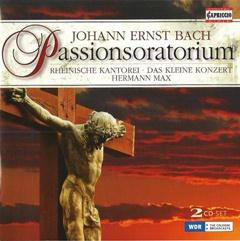Johann Ernst Bach – Passion Oratorio, Ode, Motet (Hermann Max) [1989]
Johann Ernst Bach – Passion Oratorio, Ode, Motet (Hermann Max) [1989]

Passionsoratorium 1.Chorale: O Seele, deren Sehnen aus heil'gen (Chorus) 2.Kommt! Lasst uns anbeten (Chorus) 3.Arioso: Ist's moglich, Vater (Tenor) 4.Recitative: Ihn, dem zum hohen Mut die Stunde winkt (Soprano) 5.Aria: Mein Geist! Ach, kannst du jetzo schlafen? (Soprano) 6.Recitative: O Gegend, die du sonst von milden Lehren (Tenor) 7.Aria: Du Hand des Segens (Tenor) 8.Chorale: Brich das schnode Zauberband (Chorus) 9.Recitative: Er naht dem Blutpalaste schon (Counter-Tenor) 10.Duet, Arioso: Sollt, einst ich was Unedles wagen (Soprano, Counter-Tenor) 11.Chorale: Schlage, Jesu, an mein Herz (Chorus) 12.Recitative: Und nun sieht der verhohnte Held (Bass) 13.Aria: Morder, und ihr fordert (Tenor) 14.Die Stimme eures Bruders Blut (Chorus) 15.Chorale: Lernt auch ihr, die der Fluch bewegt (Chorus) 16.Recitative: Man sieht die Geissel schon (Counter-Tenor) 17.Aria: Und ich betrate nicht die Pfade (Soprano) 18.Die muden Seelen starket er (Chorus) 19.Chorale: So wie er sie getragen (Chorus) 20.Recitative: Er geht, und seine Tritte netzen Zahren (Bass) 21.Chorale: Wenn ich fur Gericht soll treten (Chorus) 22.Recitative: Jetzt schaut vom Weltaltar (Counter-Tenor) 23.Chorale: Nur Trost ist's, der vom Mundle fliesst (Chorus) 24.Die Strafe liegt auf ihm (Chorus) 25.Arioso: Das du den Hirten Freude sangst (Soprano, Chorus) 26.Recitative: Der ew'ge Hohepriester schliesst (Tenor) 27.O du Mauer der Tochter Zion (Chorus) 28.Adagio: Rollt, Zahren, mild die Brust hinab (Counter-Tenor, Tenor) 29.Aria: Blut der herrlichsten Erlosung (Soprano) 30.Jerusalem sei getrost (Chorus) 31.Chorale: Der du, die nach dir sich nennen (Chorus) 32.Freunde Jesu, weint indessen (Chorus) Wenn Donnerwolken uber dir sich turmen (Das Vertrauen der Christen auf Gott) 33.Wenn Donnerwolken uber dir sich turmen (Chorus) 34.Accompagnato: Hab ich mit Zweifeln nah streiten (Tenor) 35.Aria: Gott wird nicht immerdar verstossen (Tenor) 36.O Gott, wo ist ein Gott wie du (Chorus) Meine Seele erhebt den Herrn 37.Meine Seele erhebt den Herrn (Chorus) 38.Denn er hat seine elende Magd (Soprano, Chorus) 39.Und seine Barmherzigkeit (Soprano, Counter-Tenor) 40.Er ubet Gewalt mit seinem Arm (Chorus) 41.Die Hungrigen fullet er (Soprano, Counter-Tenor, Tenor, Bass) 42.Wie er geredet hat unsern Vatern (Chorus) 43.Lob und Preis sei Gott, dem Vater (Soprano, Counter-Tenor, Tenor, Bass, Chorus) 44.Wie es war im Anfang (Chorus) Barbara Schlick, Martina Lins (soprano) Silke Weisheit (contralto) David Cordier (counter-tenor) Christoph Prégardien, Martin Schmitz (tenor) Stephen Varcoe, Hans-Georg Wimmer (bass) Rheinische Kantorei & Das Kleine Konzert Hermann Max – conductor
Today it is the Passions of J.S Bach which are most commonly known. The Passion Oratorio by J.S Bach’s nephew, godson and pupil Johann Ernst Bach is lesser known. On this Capriccio re-release his Passion Oratorio is performed alongside an Ode on the 77th Psalm for tenor, chorus and orchestra and a Motet for solo voices, four-part chorus, strings and continuo. --- mdt.co.uk
The Bach family have many members with Johann Ernst (1722-1777) being the nephew, godson and pupil of the more illustrious Johann Sebastian. Born in Eisenach he was the son of Johann Bernhard Bach, the second cousin of J S, whom he eventually succeeded as Eisenach's organist and court harpsichordist.
The Passionsoratorium differs from the Passions of J S in both style and size, lasting just over 90 minutes. It is a more intimate work than the big Passions of his uncle, calling for four soloists, 2 flutes, 2 oboes, 2 bassoons, 2 horns, strings and bass continuo. The influence of his uncle can be clearly heard in the work, whilst it is employs the prevalent style of the time, with this mix of old and new creating an attractive whole.
The Ode on the 77th Psalm, Das Vertrauen der Christen auf Got, is a 16 minute mini masterpiece for tenor, chorus and orchestra, While the final piece on this two CD set, Meine Seele erhebt den Herr, is a Motet for soloists, four-part chorus, strings and bass continuo. The Motet, as with the Passion, shows the influence of his uncle, but also, as with the Passion, Johann Ernst shows himself to be his own man, influenced by other in producing his own voice.
The performances throughout are on the whole excellent, Christoph Pregardien deserves a special mention, especially for his singing in the Ode, the only drawback being the counter tenor David Cordier, whose voice, whilst being good is not as strong as some, and sounds to be at the edge of his range at times. Once again the chorus and orchestra are on top form, with Hermann Max controlling the proceedings well.
The notes are good, and whilst the texts of the works are provided, they are unfortunately only in German, which is a real shame, as this would have aided the listener's enjoyment of the music.
This is an important set, and one which, while there are issues, with the counter tenor and lack of translations, they are not enough for me not to still recommend whole heartedly! --- Stuart Sillitoe, amazon.com
download (mp3 @320 kbs):
yandex 4shared mega mediafire zalivalka cloudmailru uplea
